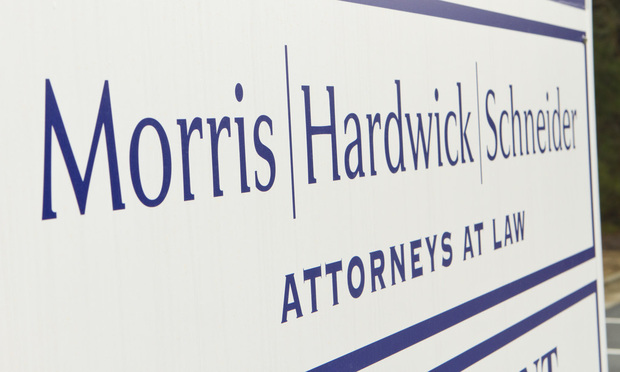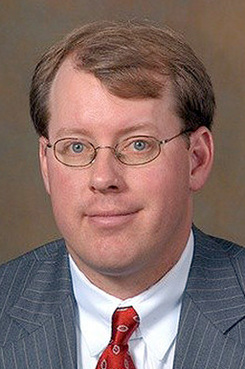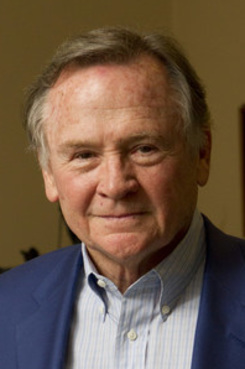Embezzlement Trial Over Defunct Atlanta Firm Will Hinge on Intent
Prosecutors say they'll show Nathan Hardwick siphoned funds from now-bankrupt Morris Hardwick Schneider to fuel his "lavish spending," including more than $16 million on charter jets, gambling and women.
September 13, 2018 at 03:30 PM
8 minute read
 Morris Hardwick Schneider signage
Morris Hardwick Schneider signage
Formerly high-flying Atlanta lawyer Nathan Hardwick IV's criminal trial starts on Monday, two-and-a-half years after federal prosecutors indicted him for allegedly embezzling millions from his now-bankrupt law firm, Morris Hardwick Schneider.
 Nathan Hardwick IV, Atlanta
Nathan Hardwick IV, AtlantaThe government alleges that Hardwick stole almost $21 million from MHS's client escrow accounts from 2011 through the end of July 2014 and spent almost $16 million on charter jets, casinos, bookies and women alone. Hardwick was the majority owner of the residential real estate closing and foreclosure firm—once one of the largest in the nation, with about 800 employees in 13 states.
The case, which is being tried by assistant U.S. attorneys J. Russell Phillips, Doug Gilfillan and Lynsey Barron, could hinge on their ability to convince jurors that Hardwick's “lavish spending” was fueled by funds that they must demonstrate Hardwick unlawfully siphoned from MHS.
The defense team, led by Ed Garland of Garland, Samuel & Loeb, does not dispute Hardwick's big spending or that their client received large draws from MHS, but they have maintained since the escrow shortfalls became public in August 2014 that Asha Maurya, who was MHS's controller, is the real culprit. Maurya made excessive payouts to Hardwick, according to his lawyers, but he understood them to be legitimate, as either profit disbursements or expense reimbursements.
The U.S. Attorney's Office for the Northern District of Georgia in February 2016 indicted Hardwick and Maurya, his alleged co-conspirator, who oversaw the escrow and operations accounts for MHS and its title company, LandCastle Title.
 Ed Garland, Garland, Samuel & Loeb, Atlanta
Ed Garland, Garland, Samuel & Loeb, AtlantaMaurya pleaded guilty to one count of conspiracy to commit wire fraud in May 2017 and is cooperating with the prosecution. Hardwick is charged with 25 offenses, including one count of conspiring to commit wire fraud and multiple counts of wire fraud and making false statements to financial institutions. If convicted, he faces up to 34 years in federal prison.
The jury can expect to learn a lot about law firm accounting during the trial, which is expected to last a month, before Judge Eleanor Ross of the Northern District of Georgia.
But these are not run-of-the-mill law firm accounting issues. Prosecutors say Hardwick spent $3.7 million on charter jet flights, $7.2 million on casinos and bookies and almost $4.7 million on girlfriends and “female social companions” from 2011 through August 2014. They allege that most of that almost $16 million was stolen from MHS's trust accounts.
The firm's net income from 2011 to 2013 was just over $10 million according to its audited financial statements, and it paid out almost $11.5 million to its equity partners, the prosecutors said in court filings. But Hardwick received almost $20.7 million in payouts, according to their forensic tallies, they added.
The trial is expected to last so long because of the complexity of the case, which “involves the analysis of the operations and accounting procedures” of a large real estate closing and foreclosure firm with more than 140 operating and escrow accounts “through which hundreds of billions of dollars moved during the time period in question,” according to filings from Hardwick's legal team. Discovery included more than 1.5 million pages of documents.
Hardwick headed MHS's residential closing side, based in Atlanta, and owned 55.5 percent of the firm. His former partners, brothers Mark and Gerard Wittstadt, ran the foreclosure operation from Maryland and owned 22.2 percent apiece.
As the majority owner and “face of the firm,” Hardwick's role was business development, not overseeing the closing division's operations, so he was unaware that Maurya was giving him excess distributions, his lawyers have said since the escrow account shortfalls became public four years ago.
The Wittstadts first accused Hardwick of embezzling $30 million from MHS in a civil suit filed in Fulton County Superior Court in late August 2014. Fidelity National Title, the firm's title underwriter, had stepped in to cover escrow account shortfalls in exchange for a majority interest in LandCastle Title, and Fidelity and the Wittstadts ousted Hardwick from the firm and renamed it Morris Schneider & Wittstadt. The firm filed for bankruptcy almost a year later, in July 2015.
'DUPED' OR INSTIGATOR?
As the prosecution acknowledges in pretrial filings, “motive and intent are the key issues in the case and will be hotly contested at trial.”
Even if the prosecutors can document that Hardwick received millions from MHS and spent it on charter jets, gambling, women and other seemingly non-firm-related expenses, they must convince a jury that he knowingly stole the money from his now-defunct firm.
The government will demonstrate that Hardwick “knew he was receiving more than he was entitled to from MHS,” the prosecutors say in court filings, and that Hardwick and Maurya were “knowingly deceiving his minority partners” about how much Hardwick was taking out of the law firm.
One of the most hard-fought pretrial battles has been whether the prosecution can describe Hardwick's big spending to a jury. Hardwick's lawyers have argued in court filings that their client's personal expenditures are his own concern and irrelevant to the case. Hardwick's “lavish spending” should not be presented to a jury, as it could create “class bias,” his lawyers said.
But the prosecution has argued that Hardwick's desire to maintain his “lavish lifestyle” was the motive for the alleged embezzlement. “Hardwick contends that he was rich and successful and had no intent to defraud anyone,” the prosecution said in pretrial filings. “He also contends that he is the victim in this case, and that he was 'duped' by his alleged co-conspirator, Asha Maurya, into accepting millions of dollars in payments from MHS to which he was not legally entitled.”
But starting around 2011, Hardwick could no longer support his lifestyle on his MHS income, according to prosecution filings. “Stung by the financial crisis and real estate collapse in 2008, [Hardwick] was in debt and unable to make loan, divorce and other payments in 2009 and 2010.”
MHS's equity partners missed a number of draws in 2010 because the firm did not have the income to pay them, the prosecution asserts, adding that, by late 2010, Hardwick “was delinquent on multiple personal loans” and “bouncing checks all over town.”
“Thus he had a strong motive to begin stealing from his law firm in 2011 when the conspiracy began,” the government claims.
Hardwick in 2011 started improperly directing Maurya to wire-transfer millions of dollars from MHS to a personal holding company that Hardwick, a golf-lover, dubbed Divot, the prosecutors allege, and he used the Divot account to pay for the jets, gambling, women and other expenditures until the shortfalls in the trust accounts were discovered in late July 2014.
The judge denied the defense's motion in limine to exclude evidence of Hardwick's spending at trial. “The danger of unfair prejudice to Defendant is substantially outweighed by the probative value of the evidence,” Ross wrote in her order, adding that she will read a limiting instruction to the jury.
Ross also denied a defense motion to exclude the collapse of MHS from the trial. Hardwick's lawyers argue that the firm's demise was due to the actions of the Wittstadts and Fidelity after they ousted Hardwick from the firm—particularly the negative publicity from the civil suit, which spawned multiple suits from creditors and caused clients to flee.
Based on evidence the prosecution will present, the judge ruled, the jury “could find [the firm's collapse] was in large part due to Defendant's actions,” and “this evidence is relevant to the issue of whether Defendant acted with intent to defraud.”
READ MORE:
Hardwick Says He Was Rainmaker, Not Embezzler, at MHS
Morris Schneider Wittstadt Says Bad Publicity From Creditors' Suits Sparked Bankruptcy Filing
Feds Indict Former Managing Partner Nathan Hardwick For $20M Embezzlement
Former Morris Hardwick Schneider Controller Pleads Guilty to Fraud Conspiracy
This content has been archived. It is available through our partners, LexisNexis® and Bloomberg Law.
To view this content, please continue to their sites.
Not a Lexis Subscriber?
Subscribe Now
Not a Bloomberg Law Subscriber?
Subscribe Now
NOT FOR REPRINT
© 2025 ALM Global, LLC, All Rights Reserved. Request academic re-use from www.copyright.com. All other uses, submit a request to [email protected]. For more information visit Asset & Logo Licensing.
You Might Like
View All
Sunbelt Law Firms Experienced More Moderate Growth Last Year, Alongside Some Job Cuts and Less Merger Interest
4 minute read
Fowler White Burnett Opens Jacksonville Office Focused on Transportation Practice
3 minute read
Georgia High Court Clarifies Time Limit for Lawyers' Breach-of-Contract Claims
6 minute read
Southeast Firm Leaders Predict Stability, Growth in Second Trump Administration
4 minute readTrending Stories
Who Got The Work
J. Brugh Lower of Gibbons has entered an appearance for industrial equipment supplier Devco Corporation in a pending trademark infringement lawsuit. The suit, accusing the defendant of selling knock-off Graco products, was filed Dec. 18 in New Jersey District Court by Rivkin Radler on behalf of Graco Inc. and Graco Minnesota. The case, assigned to U.S. District Judge Zahid N. Quraishi, is 3:24-cv-11294, Graco Inc. et al v. Devco Corporation.
Who Got The Work
Rebecca Maller-Stein and Kent A. Yalowitz of Arnold & Porter Kaye Scholer have entered their appearances for Hanaco Venture Capital and its executives, Lior Prosor and David Frankel, in a pending securities lawsuit. The action, filed on Dec. 24 in New York Southern District Court by Zell, Aron & Co. on behalf of Goldeneye Advisors, accuses the defendants of negligently and fraudulently managing the plaintiff's $1 million investment. The case, assigned to U.S. District Judge Vernon S. Broderick, is 1:24-cv-09918, Goldeneye Advisors, LLC v. Hanaco Venture Capital, Ltd. et al.
Who Got The Work
Attorneys from A&O Shearman has stepped in as defense counsel for Toronto-Dominion Bank and other defendants in a pending securities class action. The suit, filed Dec. 11 in New York Southern District Court by Bleichmar Fonti & Auld, accuses the defendants of concealing the bank's 'pervasive' deficiencies in regards to its compliance with the Bank Secrecy Act and the quality of its anti-money laundering controls. The case, assigned to U.S. District Judge Arun Subramanian, is 1:24-cv-09445, Gonzalez v. The Toronto-Dominion Bank et al.
Who Got The Work
Crown Castle International, a Pennsylvania company providing shared communications infrastructure, has turned to Luke D. Wolf of Gordon Rees Scully Mansukhani to fend off a pending breach-of-contract lawsuit. The court action, filed Nov. 25 in Michigan Eastern District Court by Hooper Hathaway PC on behalf of The Town Residences LLC, accuses Crown Castle of failing to transfer approximately $30,000 in utility payments from T-Mobile in breach of a roof-top lease and assignment agreement. The case, assigned to U.S. District Judge Susan K. Declercq, is 2:24-cv-13131, The Town Residences LLC v. T-Mobile US, Inc. et al.
Who Got The Work
Wilfred P. Coronato and Daniel M. Schwartz of McCarter & English have stepped in as defense counsel to Electrolux Home Products Inc. in a pending product liability lawsuit. The court action, filed Nov. 26 in New York Eastern District Court by Poulos Lopiccolo PC and Nagel Rice LLP on behalf of David Stern, alleges that the defendant's refrigerators’ drawers and shelving repeatedly break and fall apart within months after purchase. The case, assigned to U.S. District Judge Joan M. Azrack, is 2:24-cv-08204, Stern v. Electrolux Home Products, Inc.
Featured Firms
Law Offices of Gary Martin Hays & Associates, P.C.
(470) 294-1674
Law Offices of Mark E. Salomone
(857) 444-6468
Smith & Hassler
(713) 739-1250






